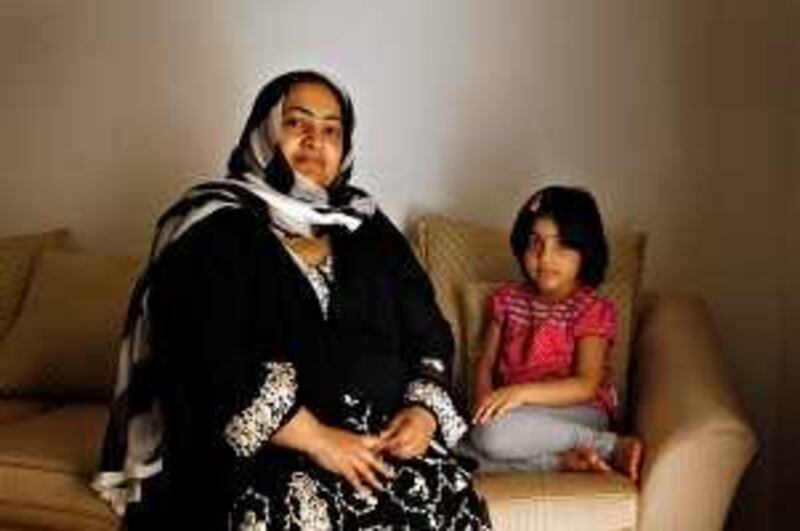DUBAI // In a first for the UAE, doctors have carried out a kidney transplant operation on a child. Hajera Qudoos, a five-year-old Pakistani, is recovering at home following a seven-hour procedure in February at Sheikh Khalifa Medical City (SKMC) in Abu Dhabi.
She was diagnosed with kidney failure and endured months of dialysis treatment. With her health deteriorating rapidly, her uncle, Mohammed Anjum, was confirmed as the most suitable donor, allowing doctors to perform a surgery that required greater precision than for adults, due to children's smaller and more delicate organs. The procedure, led by Dr Abrar Kahn, was complicated further because the organ of an adult was transplanted into the body of a child.
Recalling the "almost two-year-long struggle" to save her daughter's life, Hajera's mother, Tahmina, said yesterday that the child was recovering well. "She is playing around, jumping, running, everything. She feels free and happy. She is asking when she can go to school," said Mrs Qudoos, 36, who is originally from Pakistan and lives in Sharjah with her husband, Abdul, 40, and son, Abdulhadi, six.
The first signs that something was wrong with Hajera were evident after she turned three. "She was very pale and tired," said Mrs Qudoos. The source of Hajera's poor health remained unknown until January 2009, when a renal profile a series of tests to examine kidney function was performed at Tawam Hospital in Al Ain. "We were on the way home when they called from the hospital and asked us to go back immediately," Mrs Qudoos said.
The diagnosis was kidney failure. Mrs Qudoos realised almost immediately that if Hajera was to have a chance of a healthy life she would need a kidney transplant. While the solution was clear, how to get to it was not. There were questions as to who could perform a transplant and where, and how it would be paid for. After a month of searching, which involved consulting doctors here as well as in Pakistan, the family was told about the transplantation programme at SKMC. Managed by the Cleveland Clinic, SKMC is owned and operated by Abu Dhabi Health Services Company, which is responsible for all public hospitals and clinics in Abu Dhabi.
Mrs Qudoos was unsure if she would get help there. Her insurance policy did not cover costly procedures such as a kidney transplant. "Thinking about the finances, my courage would go down," she said. However, Hajera was deemed eligible for a transplant free of charge as long as the family provided a living donor. In spring last year, as the first steps were made towards the procedure that could save her, Hajera's health deteriorated further.
"She was very skinny. She had leg pain and was vomiting," Mrs Qudoos said. "From time to time, she would bleed through the nose. When she was sleeping, she was going into really deep sleep." She said Hajera also stopped growing, a common problem in children with kidney failure. Doctors gave the family a machine that removed waste from Hajera's body through a process called peritoneal dialysis. The procedure involves pumping a solution of sugar and salts into the cavity where one's stomach, liver and bowels are located. Through reverse osmosis, the wastes that sick kidneys are unable to eliminate end up in the solution and are then removed from the body.
"In the beginning, she used to scream as the water was entering her body," Mrs Qudoos said. The treatment was given every night for 12 hours and this became the girl's routine for more than eight months. To minimise the risk of infection, the family had to move to a larger home, where a small room, always kept impeccably clean, was set aside for the dialysis treatments. "It was a full education on how to take care of her," Mrs Qudoos said.
After Mr Anjum, 45, the brother of Mr Qudoos, was confirmed as the best donor for the child, the surgery could go forward. The two operations were performed simultaneously on February 14. Of the two, Hajera's was longer, lasting seven hours. Dr Khan, the head of transplantation at SKMC, performed the operation. Since his arrival in the UAE in 2007, he has carried out 23 kidney transplant operations on adults.
Transplants in children, he said "are especially difficult for a variety of reasons". One is that children have smaller organs and operating on them requires a greater precision. In addition, it is hard to transplant the organs of an adult into the body of a child. "An adult kidney is very large, placing it and positioning it properly so the blood flow is right is difficult," said Dr Khan. Hundreds of patients in the UAE were awaiting transplants, he said. So far, only a few can be helped because only transplants from live donors are allowed under UAE law.
Dr Khan said the long-term health of donors was not at risk. "The donors have exactly the same quality of life as before donating the kidney," he said. "It is a sacrifice from an altruistic standpoint, but from a physiological point of view there is no difference." Meanwhile, for the recipients, the procedure offers a new life. "For both adults and children, transplants completely change life in every aspect," Dr Khan said.
Mrs Qudoos agreed, comparing her daughter's condition before the transplant to that of a plant that had gone without water for a long time. "But when you start watering it, it blooms," she said. With her daughter recovering at home, Mrs Qudoos thanked the team of doctors, nurses and hospital officials who helped her. "Staying in hospital is a misery," she said. "But it makes a big difference when they are treating your child in a good way, you are dealing with competent doctors and they talk to you nicely."
"I also want to thank the Government for having such programmes for patients. I am an expatriate but my daughter was considered eligible for this." @Email:vtodorova@thenational.ae






